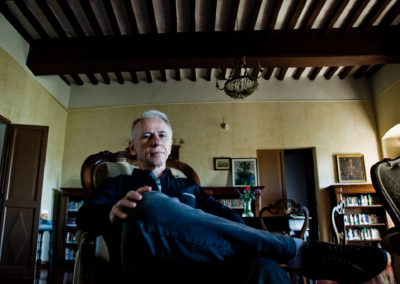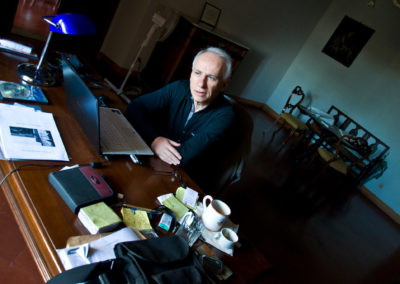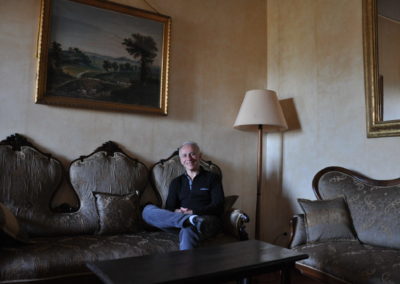I went to Civitella Ranieri Castle with the purpose of writing a novel about oddity and loneliness, and I found that the circumstances of my life there, reminded me of feelings that were similar to the novel’s story and tone.
If you desire it, the castle offers a situation of loneliness, of magnificent isolation, (not the one of The Ivory Tower –Civitella Ranieri’s were made from austere stone-) but an isolation that allows great concentration at work. I passed that season in a state of strangeness: far from my reassuring routines and my native tongue, surrounded by people that I’ve never seen before, and who were to accompany me for a considerable period of time. The strangeness faded away when I realized that we constituted a sort of brotherhood, united by a familiar air.
Amo, the title of the novel I´m writing nowadays, deserves a few words.
In Spanish, “Amo”, means master, but in a very strong sense, as the opposite of slave. Like in Hegel´s Master-slave dialectic. But it´s also the first singular person in the present tense of the verb “to love”. So, “Amo” has the meanings of “Master” and/or “I love”. And who are our masters? Death and Love, Eros and Tanatos, who fight an immemorial war inside us. We are their battlefields.
First page of AMO
At weekends his parents take him to a Jewish club in Tigre. They usually stay at a park with trees near the river. While adults are cooking barbecue, children are playing football or hide and seek. Most children enjoy hiding themselves under a group of pines. Some of their branches grow almost touchingthe ground, so low that they form a kind of cave in which the children need to crouch down to enter. Inside there, a concrete flagstone lies; the oldest children say it is a tomb – now Alberto thinks it was the cap of a pipe or of a septic tank, but at that time he was convinced it was a tomb-. The oldest children tell them dead bodies decompose under the ground and worms eat them.
This disclosure frightens him as well as causes a weird effect within him: he can’t believe it, and at the same time he thinks that it is true. He doubts. He thinks that it is impossible they may have such a horrible destination -he wonders what they might have done to be punished with such cruelty-, however, it sounds true, perhaps precisely because it is horrible. Alberto remains sad and scared. He does not want to talk about that topic with his parents as he is afraid they may tell him that it is true, death is like that. He is not the same anymore. Sometimes he is pervaded by a feeling of strangeness which, at some moments, relieves his distress. He is calmed down by adopting a skeptical attitude; looking at reality from aside, as if he got out of the scene, not to sit down in the stall to watch the play; but to get behind the scenes, studying suspiciously both the actors and the audience, those ones who represent as well as those who believe that what is happening on the stage is true.
Just some time later, his maternal grandmother dies. That day he has visited her with her mother by chance. They open the door with their keys –the grandmother cannot open the door, she is bedridden-. While his mother enters the bedroom to see her, he is delayed in the kitchen looking for some biscuits. Suddenly, his mother runs out of the bedroom and phones a doctor; she is crying so much that she can hardly speak. He takes the opportunity to enter the bedroom. His grandma is in bed, she seems to be sleeping; he touches her face, she is not even cold. Apparently, dying is not different from sleeping. Reality is not interested in looking realistic. But, although he does not notice any change, he knows his grandma has experienced a definitive one: she has died and soon her body will decompose and worms will eat it.



